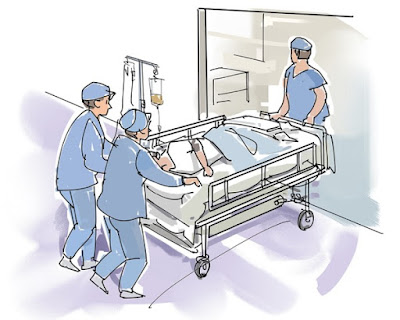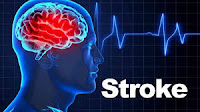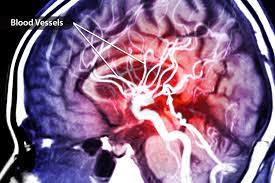I subscribe to everything related to health and stroke, and this article amazed even me, who rarely gets shocked anymore.
I was well and then I wasn't. In one second, my life changed forever. I type with only one, functional hand and am the author of "The Tales of a Stroke Patient," the true story behind my hemorrhagic stroke and its consequences, including gruesome health professionals, frightful depression, and near-death encounters. I'll take you on the journey in this blog I've written for over 10 years, but be prepared for a bumpy ride. Contact info: Joyce Hoffman / hcwriter@gmail.com
Apr 27, 2021
WTF! They're Living People, For Cryin' Out Loud: The Sad Saga of Futile Trauma Transfers
I subscribe to everything related to health and stroke, and this article amazed even me, who rarely gets shocked anymore.
Apr 14, 2021
Young Multiple-Stroke Patient Gives Parent PTSD
Count 'em, folks. F-I-V-E!
This post all started from an email I received anonymously:
I'm the parent/caretaker of a 9yrs old pediatric stroke survivor. I have been suffering from PTSD since his first event. He is now 14yrs, has had 5 strokes to date and I call him a'thriver'. But I just never know when...the...next...might come? My son's condition will not 'get better' or just 'go away'. He will never 'get over it' and as a result, I've had to put my constant fear in my pocket and just keep going. I'd like to know more about studies done on 'parents' of pediatric stroke survivors and how common the PTSD experience is within this group.
That being said, you are not alone. Pediatric cancer, tumors, severe injuries,Type 1 diabetes, epilepsy, or other neurological disorders can cause post-traumatic stress. Symptoms may include:reliving the experience, avoiding remindersof the event or condition, feeling numb or detached from others, anxiety, difficulty concentrating and being constantly on the lookout for danger.
Most Notable: Riley Children's Health from ndiana University Health says an estimated 10-20% of parents with medically fragile children meet the clinical criteria for PTSD.
The triggers may be different, but the results can include hypervigilance, withdrawal, anger and guilt.
From the National Institutes of Health: "Despite evidence suggesting that rates of PTSD in parents decline over time, a significant proportion of parents continue to suffer clinically significant levels of distress in the long-term.
"It remains difficult to characterise the trajectory of parent distress over time for a number of reasons. Past research has mainly examined a single illness group, and many studies use different scoring tools and methods, making it difficult to determine trajectories over time, the predictors of functioning at different phases of the model, and whether illness factors or the type of illness contributes to different outcomes."
The Take a Breath Cohort Study from the Royal Children’s Hospital, Melbourne, Australia, is underway to determine how significant this problem is across different illness groups, and the "extent to which there is spontaneous resolution of symptoms requiring no further intervention, or to what extent early intervention is warranted."
The link, the study confirms, between parent psychological distress and notable childhood illness has phenomenal effects for pediatric healthcare and parental PTSD.
The study goes on to say, "A greater understanding of parent distress reactions and their impact will also assist in the allocation of resources to address this problem, with those potential resources ranging from basic psycho-education, to more involved psychological approaches (e.g.interventions based on cognitive behavioural therapy or acceptance and commitment therapy) to involvement with psychiatry can provide a map for treatments that are preventative, innovative, and targeted to the true needs of the child, family, and healthcare system.”
Kidshealth.org says, "Studies show that people with PTSD often have atypical levels of key hormones involved in the stress response.
"For instance, research has shown that they have lower-than-normal cortisol levels and higher-than-normal epinephrine and norepinephrine levels, all of which play a big role in the body's 'fight-or-flight' reaction to sudden stress. (It's known as 'fight or flight' because that's exactly what the body is preparing itself to do — to either fight off the danger or run from it.)"
https://blackbearrehab.com:
- Flashbacks can be scary to children and to parents as well.
- Depression, anxiety may arise.
- Hypervigilance may startle children.
- PTSD often leads to substance abuse.
So yes, you are not alone with PTSD and an ill child. To my readers, and to Anonymous, seek medical advice if you suspect PTSD, and you may be entitled to medical and other support. You have my best wishes in this unimaginable struggle.
Apr 10, 2021
Do You Think Stress Alone Can Cause a Stroke?
My stroke was inherited, a Protein S deficiency which causes blood clots. And you probably know the rest and the reason this blog came about.
I've been quite stressed lately because I've been inside, no thanks to the pandemic, and I thought, bordering on overthinking, would stress give a person a stroke? Or a second stroke?
Most people already understand that high blood pressure, high cholesterol, and smoking increase a person’s risk of stroke. But without those negative situations, can plain old stress cause a stroke? Unfortunately, studies have shown so, all around the world. Just a sampling....
The Copenhagen City Heart Study, who asked people about their stress levels and analyzed their health, concludes, “Self-reported high-stress intensity and weekly stress were associated with a higher risk of fatal stroke compared with no stress.”Garcia says that studying the correlation of stress on stroke was easier in younger people who had strokes because they were less likely to have health issues like high blood pressure that have been linked to stroke.
It's the chronic stress, not once-in-a-while stress, that can cause a stroke. Here is a list of many signs that you're in a stressful situation:
- Chest pain
- Sudden headaches
- Low energy
- Stomach problems such as diarrhea
- Tense muscles
- Shaking and/or cold sweaty hands
- Insomnia
- Dry mouth and difficulty swallowing
Mar 13, 2021
Physical Therapist: Push. Pull. Lift. Lower. Me: I'm 72, For Cryin' Out Loud!
 |
| Countless times on the therapy table |
I am always with pain in my affected stroke-induced leg, that sometimes gets unnoticed if I engage in an activity that I love, like watching Poldark again (which I have seen more times than I'll admit) or writing my blog (which I am doing now). I often wonder, when is it time to stop physical therapy (PT) altogether.
"In case you are not familiar with this principle, it states that, for most events, approximately 80% of the effects come from 20% of the causes. I believe this is applicable to rehab exercises – 80% of our results probably come from 20% of the exercises we give to patients (or should come from 20% of the exercises). This means that if you focus on the appropriate 3-4 exercises and cut out the rest, you will get similar results. And, I believe, better satisfaction from your patients."
Excellent thought, Dennis! More and more exercises may not be better.
Jan 30, 2021
Don’t Know Why You Had a Stroke? Maybe The Following News Will Help.
I didn't drink in excess, or smoke, or have diabetes, or have high cholesterol, or high blood pressure, or obesity, the main reasons why people have a stroke. I'll get to point, eventually. But first, some background.
Congenital Protein C or S deficiency is an inherited disorder. This means it is passed down through families. Congenital means it is present at birth.
The disorder causes abnormal blood clotting. One in 300 people has one normal gene and one faulty gene for protein C deficiency. Protein S deficiency is much less common and occurs in about 1 in 20,000 people. But overall, it's frequent, considering there are about 330 million in the US alone.
If you have this condition, either deficiencies of S and C, you are more likely to develop blood clots. The symptoms are the same as for deep vein thrombosis (DVT) and include:
Pain or tenderness in the affected area
Redness or swelling in the affected area
"Protein S deficiency may be hereditary or acquired; the latter is usually due to hepatic disease or a vitamin K deficiency. Protein S deficiency usually manifests clinically as venous thromboembolism (VTE)." Stroke, in other words.
The National Institutes for Health (NIH) says, "Protein S functions as a cofactor of activated Protein C. Its deficiency is a rare condition and can lead to deep vein thrombosis, pulmonary embolism or stroke. Protein S deficiency manifests as an autosomal dominant trait." [Explanation needed: To have an autosomal recessive disorder, you inherit two mutated genes, one from each parent. These disorders are usually passed on by two carriers.]
But the good news is there's a test for Protein S and C deficiencies, and who wouldn't want to know! A family member who shall remain nameless heard of my research into Protein S and C deficiencies, but he allowed the doctor to talk him out of it like the ostrich-head-in-the-sand approach.
If you really knew of those Protein S and C deficiencies, wouldn't you change your lifestyle a bit, like cut out all the causes mentioned in the very first paragraph?
|
Dec 24, 2020
A Stroke Survivor’s Thoughts About Happy New Year? Meh.
For those of you who know what meh is and if you think this is a negative post, it is. But please read on anyway.
After four years of Trump and the pandemic coming near the end of his single-term administration when you just wanted to scream "enough despicable Trump and his know-nothing offshoots already," and working at home with the kids running hither and yon inside your house because the virus is lurking in corners we don't even know about yet, and massive unemployment that isn't going to get better anytime soon, it is my belief that a portion of Americans aren't going to cheer in the new year like in years past.
Meh is defined as lacking interest or enthusiasm. And that defines me. So I have 5 New Year's resolutions, in no particular order, rather than my customary 10, because meh-ness has overtaken me.
1. I'll finish my third book--fiction, this time. I said that last year and started to "finish" countless times, but I started over in 2020-- countless times. Now, I know the path.
2. I won't let my frustrations irritate me like I did in the past. Getting my sock on with the heel on top, or having someone finish my sentence for me, or responding to a customer service rep three times with my birth date--it's all gone where I used to purposely kick anything that was near me.
3. I'll keep doing my exercises, albeit every time I fell in the past, my recovery would take at least two weeks, setting me behind the goal I set for myself. But now I'm in a transport chair so I don't fall anymore. Yet.
4. I'll watch Poldark--I've already seen it 12 times in a row--until I can know the lines just before they're said. (Shut up! That's my relaxation to get me thinking about #1 on this list).
5. I'm getting used to the new normal because it's going to be around for I-don't-know-how-many years. I remember my mask upon leaving and stay at least 6 feet apart in the line at Trader Joe's which is my only destination. I get excited when multiple avocados come in a tiny bag of their own. And I am obsessed with the depiction of the coronavirus. Something so evil shouldn't be so attractive. What a life I now have.
I feel about the new year like I feel about most things now. Meh. But I'll force myself to wish you, my faithful readers, a happy new year.
Dec 4, 2020
Be Honest, Caregiver: Serious Profession or Work-Shy Pastime?
I fired five of them. They are the following:
I've had a caregiver who was on drugs (I saw labeled cocaine in a plastic baggie, lying among her possessions which shebrought to work and acted like a schizophrenic with her
disorganized thinking, delusions, and hallucinations);
and a caregiver who didn't ask if she could bring her children,
and then she did (they were rambunctious twin 6-year-old
boys who whined about lunch for hours, which I bought for them just to stop moaning);
and the caregiver who would yell at me in sort of dark,
comedic fashion and laugh as if she was committing elder abuse (I didn't think that's funny);
and a caregiver who went on eating her strawberry salad
while we we were out shopping after I fell off the smooth,
glass-like chair (people around me got up to assist me while
the caregiver continued picking at her strawberry salad);
and finally, a caregiver who eagerly wanted to work, and
then, a week later, told me she had diarrhea constantly and
couldn't work anymore. (Did the diarrhea just start a week
ago? I wonder.)
Then in January 2020, eleven years later, I achieved the impossible: a caregiver that was a registered nurse at a prominent hospital who retired from her job and was continuing to look for ways to help people. I hired her and was jubilant until one day a month ago, she said she was offered a full-time job to work with a woman who had Alzheimer's, and twice the money I was paying her. I encouraged her to take the job because I couldn't even come close to the family that was offering so much.
She helped me interview new caregivers and I chose two. One was state-certified, meaning she had training on the process of becoming a caregiver, the first for me ever. The other was a seminary student.
"You could always trust a seminary student," the nurse said.
I just shrugged, thinking about all those priests who did the unthinkable.
But she, too, turned out fine and she demonstrated to be a good person. They've been working since the retired nurse wanted to take the other job.
So if you don't like your caregiver, there's more to be had, if they're not your spouse, family, friends. Otherwise, you're sort of stuck between a rock and, well, another rock.
Oct 28, 2020
Alcohol and Stroke, or Was My Grandfather Pickled and Other Stuff
My grandfather came from Austria, the home of Schnapps, which he drank at every opportune time, some a week long, of the Jewish holiday regimen. And some after Saturday services. And some before bed. I mean, it was constant. Coming from the German word "obst" meaning fruit, Schnapps was his favorite beverage, and here, as an immigrant, he put cherry or apricot preserves in the Schnapps just as they did "back home."
Schnapps is any of various strong, dry, distilled liquors commonly with a fruit flavor, and has high alcohol levels of 30% or higher, but my grandfather never got drunk, or maybe he was always drunk and my young eyes couldn't see it because that's how he was all the time. Though despite his choice of "diet," he was healthy and lived until 96. Go figure.
But not everybody is so lucky. Alcohol in steady and huge amounts contribute to stroke risk, and now I know why. Aside from high blood pressure (the most prevalent), diabetes, and atrial fibrillation, all factors in stroke risk, excessive drinking can cause liver damage, and stop the liver from making substances that help your blood to clot. This factor can increase your risk of having a stroke caused by bleeding in your brain, thus a hemorrhagic stroke or, by some interpretations, an aneurysm.
By the way, in 49 of the 50 states, and the District of Columbia, the legal limit for driving under the influence of alcohol is 0.08. In Utah, the legal Blood Alcohol Content (BAC) limit is 0.05. Commercial drivers have a limit of 0.04. Any detectable BAC is a violation for individuals under the age of 21.
The National Highway Traffic Safety Administration lists these effects on driving at different blood alcohol content levels:
- 0.02 BAC: You are likely to feel relaxed and have some
- loss of judgment. You aren't able to quickly track the
- movements of other vehicles, pedestrians, or animals. You
- lose some of your ability to do two things at once, so you
- are more likely to be distracted.
- 0.05 BAC: You begin to exhibit loss of small-muscle
- control, such as being able to focus your eyes, and you
- can have lowered alertness. You have even worse ability
- to track moving objects. Your ability to steer is degraded. If
- an emergency situation develops, such as needing to
- brake quickly or maneuver around an unexpected
- blockage, you are likely to have a poorer response.
- 0.08 BAC: You will usually exhibit poor muscle
- coordination, loss of balance, slower reaction time, slurred
- speech, loss of acuity in vision and hearing, difficulty in
- detecting danger, and impaired judgment, self-control
- , reasoning, and memory. When driving, you have difficulty
- with speed control and recognizing and reacting to signals
- and emergency situations. You have an increased risk of
- injuries in general, and particularly those related to driving
- a vehicle.
- 0.10 BAC: At this level, you will have further deterioration
- of your abilities. It will be hard to maintain lane position
- and to brake when needed.
- 0.15 BAC: You will have poor muscle control and ability to
- balance. You are likely to vomit. You will have significant
- problems in controlling your vehicle and paying attention.
Sep 24, 2020
Hey, You're Not Stupid, You're Just Naive: The Really Talented Scammers and Their Victims
(Blog preface: I promised you The Tales of a Stroke Patient and More blog so this is where "and More" comes into play).
I like to browse the Internet to see what's new, now that I'm a "shut in" more than I used to be because of the pandemic. I could spend two hours on a slow day just looking around. But then I'm done for the day. But scammers, those people trying to get your personal information, live on the Internet. The scammers come up with all the ways to make you and your money part. After all, they are greedy and live out their motto: It's never enough.
Those people who are the scammers' victims aren't stupid. They're naive, babes in the woods so to speak, about how powerful the Internet is in conniving schemes that we call scams. The victims of the scams come in all ages and genders, but they usually target the over 50 crowd because they might not be so knowledgeable with the vast powers of the Internet.
In the era of the pandemic, scams have soared because many people only go out for essentials and are working (if they haven't lost the job) from home.
Here's 5 scams that come to mind.
Online Dating Scams
Like most people who are caught in this giant net, most scammers are overseas, so prosecution gets to be an ugly and costly mess. Male scammers are often based in West Africa, while the female scammers are mostly from the eastern parts of Europe, research tells me.
Job Offer Scams
Posturing as recruiters, these scammers use fake though irresistible job opportunities to entice people.
It might begin with a text, an email, or a brazen phone call from someone claiming to be a recruiter from a well-known company like Google or Facebook who saw your resume and claiming they are interested in you for hire.
Don't fall into this trap because in the end, you'll have to pay to get hired, and when you go to the job on your first day, you weren't hired at all. Call a real recruiters and learn for yourself that the process doesn't work this way.
All recruiters have established a relationship with one big company or a ton of companies because if they find a person that's suitable for hire, the recruiters get paid a commission. That's how it works. The phony recruiter will probably ask you for money that will be automatically deducted from your account, and you might give it, but remember: The employers pay recruiters, not you.
Travel Scams
Travel scams usually start with an email, offering you and fantastic stay in a fabulous, sometimes exotic, spot for typically 5 to 7 days. It might come with an expiration date that's soon, so you would rush to make a decision. Scammers don't want you to think about this ideal vacation too much because thinking too much brings about thoughts that it may be a scam! The problems with these scams are threefold:
Tech Support Online Scams
According to a Washington Post, “Nearly half of all cellphone calls next year will come from scammers," so we need to protect ourselves from vile actions.Scammers use various social engineering techniques to fool likely victims into giving their personal information. Sometimes, they try to persuade victims into paying for protection that never comes.
These technical geniuses, if you have given them any information, throw around high-tech buzzwords that offers trust and confidence in the unsuspecting victim, so much so they can take over your computer and transfer money to their bank account if you give them your i.d. and password.
Online Shopping or Auctions Scams
We are not talking about big name companies like Amazon, IKEA, or Wayfair from which I have purchased items with quality customer service departments.I'm talking about a scammer who will set up a website just to steal money and sell a product, and offer you an inferior item in its place or, at times, nothing at all. They may also sell a product just to get your credit card or bank account details.
An online auction scam revolves around a scammer saying that you have a second chance to buy something on which you bid because the winner has changed his or her mind. The scammer will request for payment outside of the auction site’s tight payment location. If you give them your money, it will be lost and the actual auction site is not responsible.
From phrases.org re: too good to be true:
"This cautious view is undoubtedly even older than its first expression in English, in the sixteenth century. Nevertheless, it has been repeated in the same form ever since, with only slight variations as Mark Twain's, "It's too good for true, honey, it's too good for true" (Huckleberry Finn, 1884).
So ask yourself, "Is the offer too good to be true?" first, and therein you'll find the answer.





















